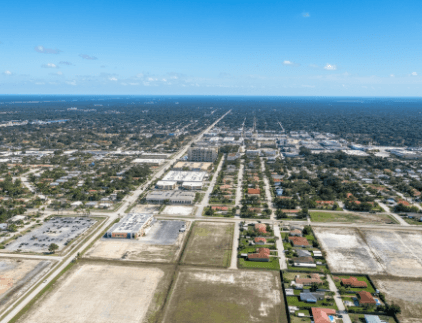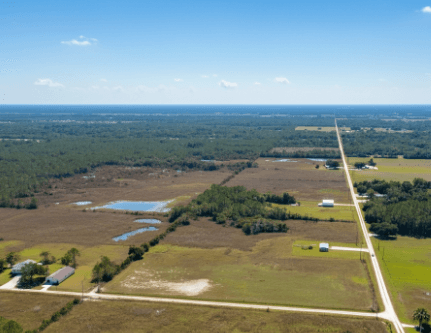In Florida’s diverse and dynamic real estate landscape, Selling Land in Rural vs. Urban Areas presents unique challenges and opportunities for property owners. Whether you’re contemplating the sale of a secluded plot in the countryside or a prime piece of real estate in the heart of the city, understanding the nuances of selling land in Rural vs. Urban areas is vital to navigating the market successfully. This blog explores the differences, potential benefits, and considerations one must evaluate when selling properties in these contrasting environments. Join us as we dive into the intricate world of land sales in the Sunshine State, offering insights and advice to landowners looking to maximize their investments in rural and urban settings.
Steve Daria and Joleigh, renowned real estate investors, have long recognized the distinct advantages of selling land in rural vs. urban areas in Florida. In rural regions, they see the potential for agricultural development and recreational properties, while urban zones offer lucrative opportunities for residential and commercial projects. Their diverse investment portfolio highlights the unique appeal and opportunities that Florida’s varied landscapes provide.
The Cottage Dream and City Convenience
Before we explore selling land in rural vs. urban areas, it’s crucial to understand that for some, owning land in the serene backdrop of Florida’s rural areas is the essence of an idyllic retreat.
Nature lovers and weekend warriors can appreciate the expanses of land for various personal projects – from farming to building a cozy cottage.
On the other hand, urban areas offer proximity to essential services, an active community life, and a higher influx of potential buyers driven by industry and lifestyle hub requirements.
Both urban and rural lands have their unique allure, which, in turn, attracts distinct buyer personas.
Understanding Urban Buyers
Urban land typically appeals to buyers who prioritize convenience, robust infrastructure, and connectivity.
City dwellers looking to expand their property portfolio or developers scouting for real estate with immediate business or residential prospects prefer urban land.

The key selling points here revolve around zoning laws, the proximity to facilities like hospitals, schools, and retail, and whether the land is ready for construction.
Engaging With Rural Enthusiasts
Rural land attracts buyers seeking solace from urban life. It caters to those interested in homesteading, animal husbandry, or desiring wide-open spaces for leisure and privacy.
Selling to this demographic requires emphasizing natural beauty, self-sufficiency opportunities, and any historical or agricultural significance the land may hold.
Legislative Landscapes: Zoning and Regulations
The bureaucratic side of selling land is often overlooked but is critical, especially in a state like Florida with intricate zoning regulations.
Zoning in Rural Florida
Rural zoning may be more permissive, allowing for diverse land use, such as farming, ranching, and conservation.
This flexibility can be a worthy selling point, as it provides buyers with various activity options without being overly restricted by regulations.
Urban Zoning Considerations
Conversely, urban land is often tailored for specific purposes and tightly regulated to preserve its urban fabric.
Understanding zoning codes is crucial as it can spell the difference between “move-in ready” and lengthy permitting processes for any planned development—a vital factor for savvy urban buyers.
Get Started: Get Your Cash Offer Below…
We are direct land buyers. There are no commissions or fees and no obligation whatsoever. Start below by sharing where your property is and where we can send your offer…
Environmental Impact and Acclimatization
With an environmentally conscious consumer base, the impact of your land’s environment, climate, and geographical features cannot be overstated.
Rural Riches: Describing Natural Assets
Rural land often boasts untouched natural beauty, rich agricultural soils, and diverse wildlife.
Highlighting these features in your marketing materials can significantly bolster your land’s appeal, especially when targeting green initiatives or buyers interested in conservation.

Urban Upgrade: Tackling Environmental Responsibilities
Urban land might have a history of industrial use or be found in areas prone to pollution. In these cases, sellers must be transparent about environmental assessments, cleanup efforts, and ongoing responsibilities to ensure smooth transactions and maintain their reputation.
Connecting With the Community
The community surrounding your land can add or diminish its saleability. Sellers need to be aware of the social dynamics at play.
Understanding Rural Sociability
Rural communities tend to be tighter-knit, often with a strong agricultural heritage. Involvement in local events or sponsorship of community initiatives can endear the sellers to these close communities, facilitating a more accessible sale.
Urban Awareness and Involvement
In urban settings, networking with local businesses, attending neighborhood meetings, and understanding cosmopolitan movements are essential to present the land within an integrated lifestyle. Buyers will seek land that aligns with community values and near-future development plans.
The Digital Dimension: Marketing and Reach
In our technology-driven world, the role of digital marketing must be considered.
A Rural Landscape Online
Marketing rural land often requires a narrative approach, using digital platforms to provide information about the land.
Drones, virtual tours, and carefully curated social media presence can transport prospective buyers into the rural setting, deepening their interest before any physical visits occur.
Urban Advertising Precision
With urban land, it’s more about reaching the right people at the right time. Targeted online ads, listings on urban-focused real estate websites, and utilizing demographic data can help land sellers position their properties in front of individuals or firms actively seeking urban real estate.
Seasonal Selling Strategies
Understanding the seasonality of selling land in rural vs. urban areas is critical to optimizing your listing.
Rural Seasonal Peaks
Cottage lands and recreational estates often peak in popularity during spring and summer, when outdoor activities are most appealing.
Sellers should plan listings and events, like open houses or fairs, and even pricing strategies around these peaks to maximize visibility and buyer interest.
Urban Market Momentum
Rural land sales are less affected by seasonal changes, as they largely depend on job markets, interest rates, and housing demands.
Engaging with real estate professionals to monitor these trends and adjusting your sales strategy accordingly can ensure that your urban plot remains competitive throughout the year.
Infrastructure Influence on Pricing
The pre-existing infrastructure on or near your land can dramatically alter its value.
Evaluating Rural Infrastructure
Rural land with utilities, roads, and any existing structures can command a higher price due to the cost-saving benefits it provides to the buyer.
Ensuring all amenities are in working order and promoting any existing infrastructure should be a priority for rural land sellers.
The Built-In Advantages of Urban Area Land
Urban land is packed with infrastructure—roads, water, electricity, and possibly even sewage and wireless connectivity.
Focusing on the land’s immediate usability can help urban sellers set their property apart in a competitive market.
Conclusion
Selling land in rural vs. urban areas in Florida involves careful consideration of numerous factors, from the land’s intrinsic qualities to the needs of future owners. By understanding these nuances and tailoring your sales strategy accordingly, you can optimize your land’s appeal and ensure a seamless and profitable sale.
Engaging with real estate professionals to monitor these trends and adjust your sales strategy can ensure your urban plot remains competitive throughout the year. The land is a unique asset that can fulfill many aspirations. As a seller, your role is to align these dreams with the tangible offering of the land, whether it’s the untamed natural beauty of the countryside or the pulsating heart of urban development.
Your decision to sell land in rural vs. urban areas in Florida will be as unique as the land itself. Each option offers a distinct set of opportunities and challenges that warrant consideration before taking the plunge. With our guide, you now possess the critical knowledge to devise a strategic selling plan, regardless of location. The success of your land sale is within reach – and it hinges on your ability to connect with the land’s true potential.
**NOTICE: Please note that the content presented in this post is intended solely for informational and educational purposes. It should not be construed as legal or financial advice or relied upon as a replacement for consultation with a qualified attorney or CPA. For specific guidance on legal or financial matters, readers are encouraged to seek professional assistance from an attorney, CPA, or other appropriate professional regarding the subject matter.
